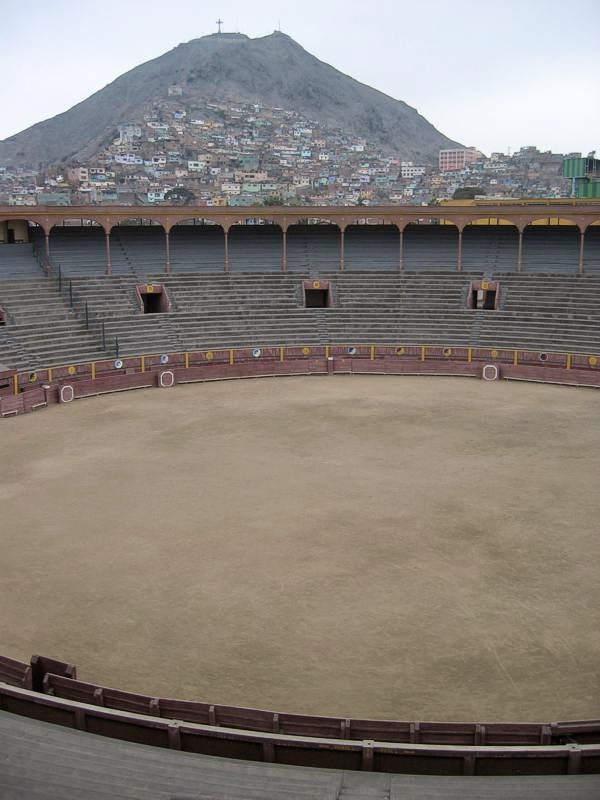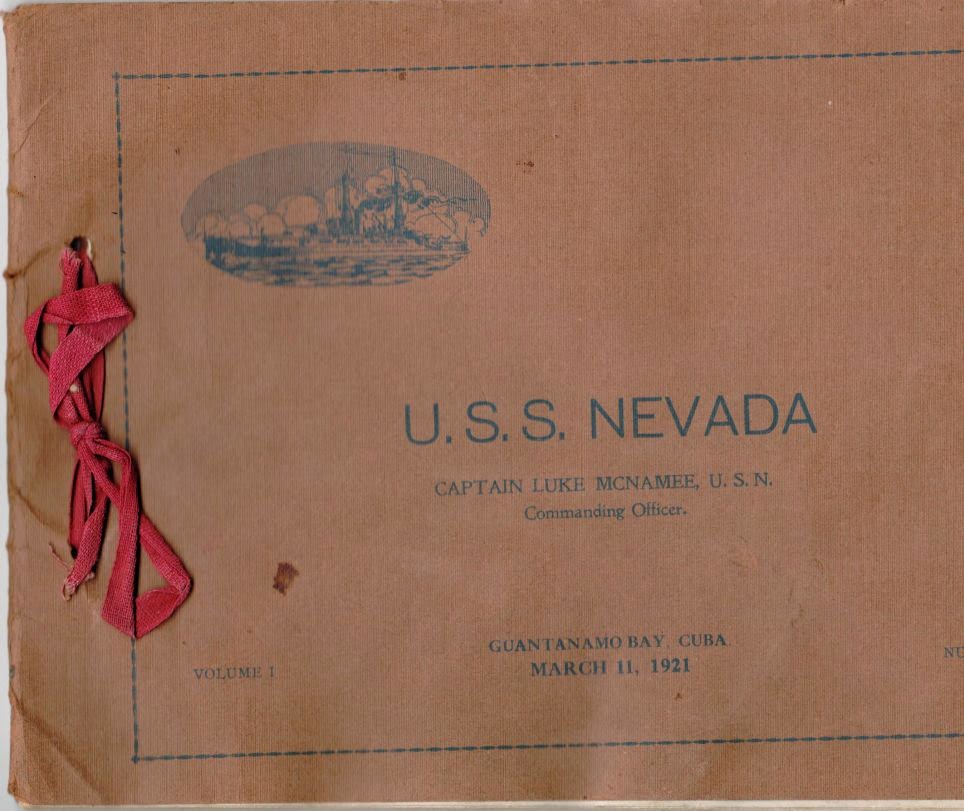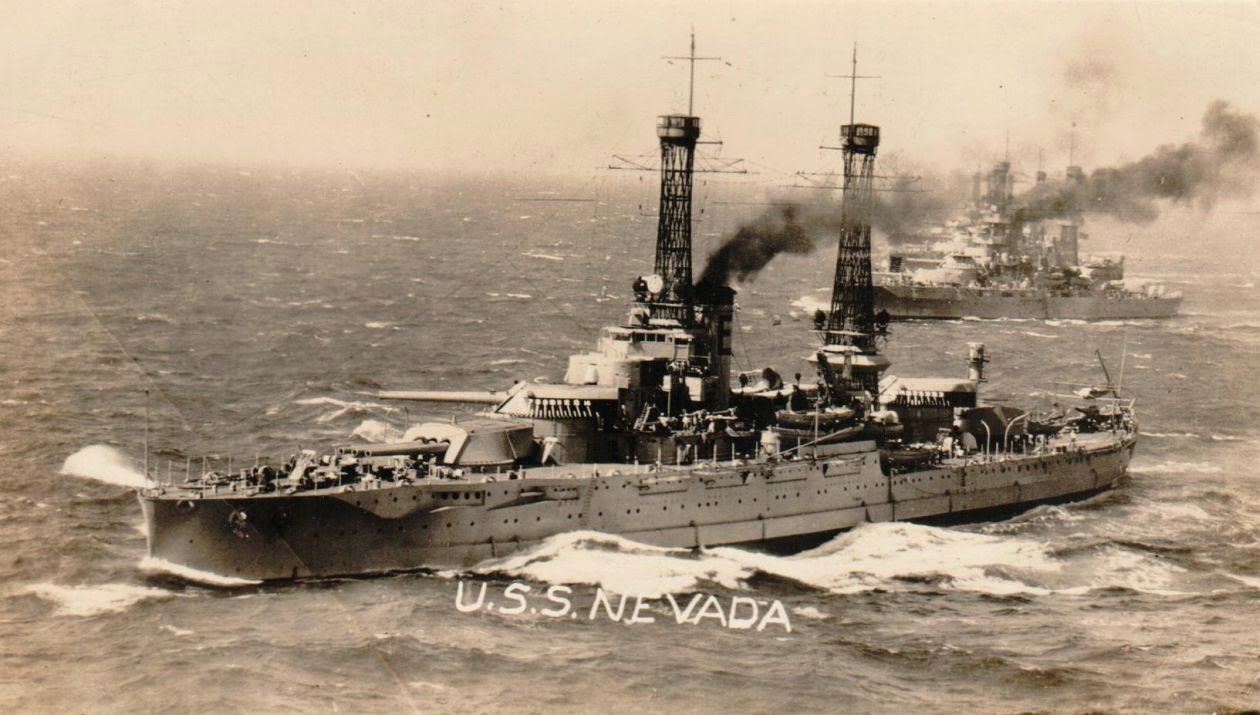Sepia Saturday challenges bloggers to share family
history through old photographs.
This week’s Sepia Saturday prompt with its mantilla-bedecked
senoritas whispering behind decorative fans suggests all things Spanish. What is more Spanish than a bullfight?
 |
| Photo Postcard of bullfight in Lima, Peru |
 |
| from Wikimedia Commons |
On the back of the photo postcard is written “Bull fight Lima, Peru.” This must be a souvenir from one of my granduncle’s tours in the Navy. My maternal grandmother’s brother Ray Rucker served on board the USS Nevada sometime between 1918 and 1922.
A comparison of the bullfight photo with a photo on Wikimedia
Commons suggests the event took place at the Plaza de Toros de Acho, the most
prominent bullring in Lima. It is classified as a national historic
monument.
A booklet marking the Fifth Anniversary of the USS Nevada contains photos of places Ray saw on his travels to the British West Indies; Guantanamo Bay, Cuba; and Lima, Peru in 1920-21.
 |
| Scenes from Cuba and Lima, Peru Page from the Fifth Anniversary booklet |
But that was not the Nevada’s first brush with Spanish.
In December 1919, the USS Nevada was one of 10
battleships and 28 destroyers that escorted President Woodrow Wilson aboard the
oceanliner George Washington to the Paris Peace Conference that officially ended
the Great War.
When the posters promised “Join the Navy and see the
world!” they weren’t kidding.
Por favor visitar a mis amigos en Sepia Sábado.
©
2014, Wendy Mathias. All rights reserved.




It's fantastic you can find photos and family history to fit the theme. I enjoy your posts.
ReplyDeleteSometimes it's a struggle. But thanks!
DeleteOlé! The anniversary booklet looks interesting. My grandfather was in the Navy earlier and kept a journal.
ReplyDeleteI bet your grandfather's journal is interesting. This booklet shows some surprising sides to the Navy, like their cartoons that are supposed to be poking fun at the system, but it's a case of "you had to be there" to appreciate it.
DeleteI have some bull fighting pictures that my uncle got in Mexico. Maybe that will be a prompt eventually.
ReplyDeleteOh goodness -- I hope not. This is IT. No more bullfighting photos.
DeleteI love your photo to go with the postcard.....your detective work proves right again.
ReplyDeleteTGIF!
Thanks -- I'm trying to remember how I even found it but it didn't take long. I guess I'm lucky Ray went to the most famous bullring.
DeleteTGIF to you too!
Bullfights are in the same category with tightrope walkers & trapeze artists for me - I can't or couldn't watch either. I've never actually been to a bull fight but I know I wouldn't be able to watch it with any degree of enjoyment. I've been to very few circuses & have always had to close my eyes when the high wire & trapeze acts began. Then again, clowns make me nervous & uncomfortable too. Anyway, I enjoyed the added information about your Great Uncle Ray's ship & his experience in WWI.
ReplyDeleteOh high wire acts are hard for me to watch too. Those people crossing between buildings and over gorges or rivers are NUTS!
DeleteEl Toro. Olé! A clever interpretation for this week's challenge.
ReplyDeleteGracias.
DeleteWell I had never associated bull fighting with Peru!
ReplyDeleteI would like to see some of those cartoons!
I certainly didn't think Peru either. As for the cartoons, maybe if Alan gives us a cartoon prompt, I'll use them. Honestly, I don't get the point of any of them except they seem to poke fun at their work and free time aboard the ship, but they're not funny to me.
DeleteYou have such wonderful sources of material for Sepia Saturday.
ReplyDeleteSometimes I get lucky but sometimes I also struggle!
DeleteAmazing to think of bull fights in Peru. I find it hard to understand the pleasure people get in watching them but historically interesting. A well put together post.
ReplyDeleteI'm sure people thought differently about bullfighting in 1921.
DeleteA super photo and a terrific match for the modern viewpoint. At age 10-11 I was taken to a bullfight in Barcelona during a family holiday. My memory, reinforced by the dozens of photos my dad and I took, is an impression of men in shiny glittering costumes brutally tormenting an animal to death. It was a very alien experience that resembled no American sport I knew of.
ReplyDeleteI don't get it either. One misstep and you're in for a big ouchie. I watched a documentary about bullfighting. Apparently there's a lot of ritual and a lot of pride in earning that cape.
DeleteI learn so much on Sepia Saturday. Thanks for sharing.
ReplyDeleteA fascinating bit of history. I do love how the Sepia Saturday theme can lead blog writers (and blog readers) up the most fascinating highways and byways.
ReplyDeleteI agree. That's why I'm so grateful to have found Sepia Saturday.
DeleteI'm with the others who see brutality in Bull Fighting. But I did love seeing the shiny colorful men's and women's outfits that are traditional Spanish costumes associated with the sport and their dances!
ReplyDeleteI think I could watch the bullfightER but I'm not sure I'd want to see what happens with the bull.
DeleteGreat that your family kept these post cards to add to the stories of their lives, and an interesting interpretation of this weeks' theme..
ReplyDeleteWhen I consider what my family kept, I wonder what they threw away.
DeleteMy first visit to a bullring was in Seville this year. The costumes, artwork and photographs in the museum were fascinating, and I think you’re right about the ritual, but I could never watch a bullfight. The anniversary album is a great piece of history to have.
ReplyDeleteThe booklet really is an interesting artifact albeit rather amateurish and simple, but for its day it is quite nice.
DeleteI have to wonder if booklets like this are produced anymore for the crews aboard the various ships. They'd be even easier now to produce, but with how huge some of the crews are I'd imagine what is relevant to one group of folks might have been completely missed by another.
ReplyDeleteThat's true -- today's crews are the size of a city.
Deletegreat to see the original photo of the bullring compared with it now. What amazing sights sailors get to see at sea.
ReplyDeleteSo true. Thanks for stopping by.
Delete